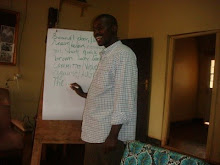I have a passion for the bald eagle or Haliaeetus Leucocephalus
according to his scientific name. I have this passion as long as
I can remember.
A passion for a bird of prey that can be seen in some parts of the World
would be more obvious. But life is full of inexplicable surprises
and left me with this passion for the bald eagle, the national
symbol of the
When I read about bald eagles and about the way they live, I
always start thinking about what a businessman can learn from
them in order to become successful and that is what this article
is about.
1. Vision
Bald eagles are birds that can often be found on very high
altitudes. There they soar and with their very sharp eyesight
they have a clear view on the world below them and especially
on the prey they want to catch; fish, that is what they like
most. They can see the milky white spot in the water from a
distance of many miles. In high places they build their nests.
On a rock, on the top of a tree but always on a spot where they
have a good view on the world that surrounds them. And from
their castle they see what is happening around them and that
gives security.
The businessman should also have a clear view on what is
happening in the market. From very far he should recognize his
potential customers and "attack" them at the right moment. At
the same time he should be aware of the dangers that surround
him, anticipate, absorb the environment and be prepared to act
immediately.
2. Knowledge
Bald eagles are confined to their territories. With the seasons
some migrate but you find bald eagles only in a specific habitat
namely forests, mountains and near sea and rivers. You won't
find them in the desert. In their habitat they know what to do,
where they can find prey and which dangers surround them. By
instinct and by learning they have knowledge about the way they
have to conduct their lives and about how they have to behave
in this habitat. They will never go beyond the limitations of this
frame work. If they do, they die.
This holds a lesson for the businessman. He should know
everything about his business and when I say everything, I mean
everything. He should know all about the products he sells from
beginning to end, every detail should be an open book to him.
He can never be surprised with questions on which he has no
answers. He should know about marketing techniques, the
position and plans of competitors etc., etc. And if he doesn't
possess this knowledge by nature, he has to learn it.
3. Enough is enough
When Bald Eagles catch prey, they will catch only one fish at a
time. It is not possible for them to catch more. But they know
precisely how to catch this one fish. Their flying skills, their
strong talons and their eyesight are extremely well developed
and fit for the job. Almost every attempt to catch a prey is
successful.
This phenomenom also holds a wise lesson for the businessman.
He has to restrict himself to a number of products he can handle
and products that matches his skills and abilities. To stay in
the animal world: if you are a cow don't try to jump fences like
a horse. People will only laugh at you. It is better to sell one
product very well than ten without a satisfying result.
4. Courage
Bald eagles mate for life and they are absolutely loyal to each
other. From high altitudes the two birds tumble down in a
dangerous free fall. Mocking the laws of gravity they unite.
Only just above the tree tops they separate and fly wing by wing
to the nest. This spectacular show requires great courage. A
businessman also needs courage to be successful. He has to make
decisions about difficult and uncertain subjects. And he also
needs to know when to stop his free fall. Having courage to make
difficult decisions is not synonymous for being reckless. A
decision that leads to disaster is not a decision, but a wild
guess.
You see....the businessman can learn a great deal from this
majestic bird that embodies not only beauty, strength and
freedom but that possesses also the essential conditions and
abilities to survive.
The beginning businessman as well, who is maybe starting his
business in great uncertainty about the future, can learn from
the bald eagle:
Thursday, June 10, 2010
BALD EAGLES: THE BUSINESS LEADER.
METACOGNITION A WAY OF MASTERING YOUR ENGLISH
METACOGNITION
Is being aware of your thinking as you perform specific tasks and then using this awareness to control what you are doing. The two majors of metacognition are:
- Knowledge and control of self
- Knowledge and control of task.
Both are essential for success in any area (academic or nonacademic)
A. Knowledge and Control of Self
Knowledge and control of self imply:
- Commitment (control)
- Attitudes (control)
- Attention (control)
Commitment: If students are not committed to learning, they probably won’t learn much. Before you begin studying English, ask yourself one question. Why do I want to study English? Is it because you want to, or because someone else wants you to? Like every decision in life, studying English must be something you want to do.
Attitudes are beliefs we have that affect how we perceive things and what we do. Students should see how to change their negative attitudes (this is not any value to me, I can’t do this, I have no control over what is happening here, where am I going to use English? I have studied English for long time, what if I fail? Are they going to chasse me? People will laugh at me if I make mistakes. I have to go to English speaking country…) into positive ones (everything is possible let’s work hard, ask for clarification, seek for a help, working in group…)
Attention (attentive): there are two basic types of attention: automatic and voluntary. Automatic attention is reflexive in nature – a reaction.
Voluntary attention is under conscious control. It is active rather than passive in nature.
B. Knowledge and Control of Task
The second major aspect of metacognition is knowledge and control of task. It involves four components:
- setting goals
- planning
- correcting for error
- evaluating
Setting goals: if you don’t know where you want to go, you probably won’t get there. Setting goals allows you to focus on what is important and ignore what is not. Your actions become more efficient because you know what you are looking for.
Planning: planning involves the deliberate selections of strategies to fulfill specific goals. That is, once you have identified a goal you begin to generate strategies for accomplishment the goal.
Correcting for error: the third aspect of knowledge and control of task is correcting for error. Here the student changes his or her plan based on negative and positive “feed – back” - how close or far way a student is accomplishing the goal. Periodically students may assess their progress toward the goal they have established and then change their behavior if necessary.
Evaluating: evaluating, the final aspect of knowledge and control of task, deals with post – assessment of how well the task went. After students have completed a task, they might ask themselves such questions: - Did I accomplish my goal? How close did I come if it wasn’t totally successful? What did I do that didn’t work?





